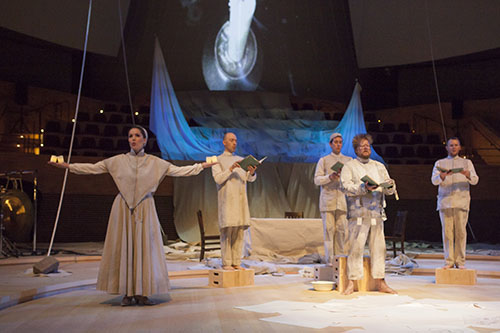 print preview
print previewback DAN O’BRIEN | Visitations
Composer’s Notes: Hearing Voices
Jonathan Berger
Dan O’Brien and I share a fascination with tormenting inner voices. We found one another as we both studied and adapted Milton Rokeach’s Three Christs of Ypsilanti. Our collaboration emerged from trading research papers and anecdotes on hallucination, glossolalia, schizophrenia, and Jerusalem syndrome.
What emerged was Theotokia—an exploration of the mind of Leon, who, afflicted by schizophrenia, experiences religious hallucinations and suffers from obsessive ritualistic behavior. We come to know Leon through the songs of his imaginary mothers of God, as well as the imagined voice of his real mother. We only hear Leon’s voice at the very end of the work, as he momentarily realizes the excruciatingly painful reality that he is alone and vulnerable. In Theotokia, the parody of Shaker songs suggested musical materials that surfaced at key moments, and the rhythms and subtle use of alliteration in the libretto was always friendly to musical setting.
 |
| From Theotokia. Photo by Joel Simon. |
As we worked on Theotokia, Dan shared his poems written while shadowing Paul Watson. The notion of pairing the story of the dead soldier’s voice haunting Paul together with the delusional world of Leon came about at a Starbucks in Santa Monica and, in many ways, The War Reporter seemed to write itself.
In The War Reporter, the rhythm of the soldier's curse—“If you do this, I will own you forever”—was, from day one, the rhythmic leitmotif throughout the opera. Dan and I went back and forth in certain spots—he, sometimes reluctantly agreeing to part with a word he felt was right—but that I felt was unfriendly to the singing voice (“duct tape” was one I recall—although I did agree to setting it once in the work). Along the way, the give and take of shaping the libretto was a terrific experience.
Both Dan and I typically work in isolation—and the collaborative nature of shaping the work was a new experience. For me, it was (almost always) a positive and inspiring experience. I think (hope) Dan agrees. ![]()
![]()
Jonathan Berger is the Denning Family Provostial Professor in Music at Stanford University, where he teaches composition, music theory, and cognition at the Center for Computer Research in Music and Acoustics (CCRMA). He was the founding codirector of the Stanford Institute for Creativity and the Arts (SICA, now the Stanford Arts Institute) and founding director of Yale University’s Center for Studies in Music Technology.